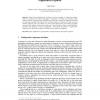Free Online Productivity Tools
i2Speak
i2Symbol
i2OCR
iTex2Img
iWeb2Print
iWeb2Shot
i2Type
iPdf2Split
iPdf2Merge
i2Bopomofo
i2Arabic
i2Style
i2Image
i2PDF
iLatex2Rtf
Sci2ools
COSIT
2009
Springer
2009
Springer
Are Places Concepts? Familarity and Expertise Effects in Neighborhood Cognition
Named urban neighborhoods (localities) are often examples of vague place extents. These are compared with current knowledge of vagueness in concepts and categories within semantic memory, implying graded membership and typicality. If places are mentally constructed and used like concepts, this might account for their cognitive variability, and help us choose suitable geospatial (GIS) data models. An initial within-subjects study with expert geographic surveyors tested specific predictions about the role of central tendency, ideals, context specificity, familiarity and expertise in location judgements – theoretically equivalent to categorization. Implications for spatial data models and a further research agenda are suggested.
| Added | 24 Jul 2010 |
| Updated | 24 Jul 2010 |
| Type | Conference |
| Year | 2009 |
| Where | COSIT |
| Authors | Clare Davies |
Comments (0)

